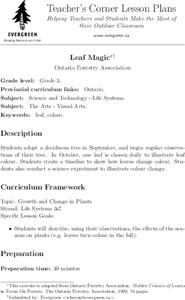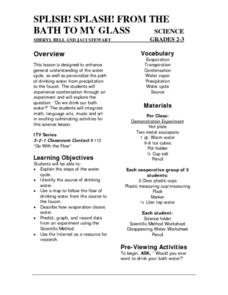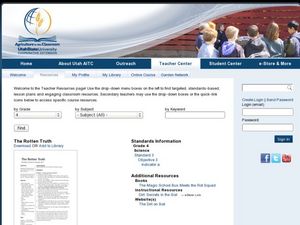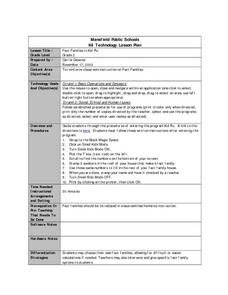Curated OER
The Physics of Hummingbirds: Magic in the Air
High schoolers study hummingbirds and how they use Newton's law. In this motion lesson students complete several activities and view videos of hummingbirds.
Curated OER
The Five Senses - Magic School Bus
Young scholars identify five senses, draw parts of body that relate to each of the senses, hear different sounds in the environment, write those experiences in their journals, and list at least four objects/things that relate to each of...
Teach Engineering
Magical Motion
Make solutions to projectile motion problems magically appear using equations. Pupils watch a clip from a Harry Potter movie and find the length of time it takes for a remembrall to fall into Harry's hands. They use a projectile motion...
Curated OER
Flower Power
An engaging, multi-session art and science instructional activity awaits your class. Within this instructional activity, you'll find everything you need to implement the plan. They go on a nature walk around their school, and must...
Curated OER
The Magic School Bus Plays Ball
Students learn along with Ms. Frizzle's class. In this Magic School Bus lesson plan, students work in small groups to find how movement changes when there is more - and less - friction.
Curated OER
Making a Magic Kingdom
Students develop a list of things to consider when developing an amusement park. After reading an article, they discover what issues arose when designing the new Disney park in California. In groups, they develop plastic models of an...
Curated OER
Magic, Sass, and Rage
Students are introduced to the characteristics of autobiographies. In groups, they read Maya Angelou's "I Know Why the Caged Bird Sings" and develop their own rules for survival in the classroom. They bring in family photos in an...
Curated OER
Web of Predators and Prey
Students investigate the food chain by researching the Internet. In this ecosystem lesson plan, students view the video "Competitor and Predator" and read a book from the series "The Magic School Bus." Students utilize a...
Curated OER
The Gaia Hypothesis: An Approach to Problem Solving in the Environment
Students are introduced to the Gaia hypothesis by examining a conceptual sketch. In groups, they analyze the way they can use Dewey's method for problem solving to solve problems within the environment. They are given a problem facing...
Curated OER
The Magic of Static
Students investigate static electricity. In this physics lesson, students participate in an experiment with balloons to demonstrate how static electricity works.
Curated OER
Parenting in the Movies:Examining Responsibilities in Modern American Films
Students use films to identify the characteristics of a good parent. In groups, they research the different types of parenting methods used during colonial times, the Civil War and the Civil Rights movement. As a class, they develop...
Curated OER
Motion and Inertia
Physics learners make magic with inertia! By pulling paper out from under a stack of blocks or batting a rubber ball into motion, physics scholars' eyes will be opened! Don't think that this lesson is only fun and games; plenty of...
Curated OER
The Magic Hooey Stick
Learners examine the use of a "magic hooey stick". They discover the concept of illusions and how science can reveal them. They answer discussion questions to end the lesson.
Curated OER
Magical Images of the Estuary
Students investigate picture taking techniques while visiting an estuary. For this picture taking lesson, students examine the "Magical Images of the Estuary" handout. They think of and list important picture taking techniques before...
Curated OER
Microbe Multiplication Magic
Students discover how microbes multiply. In this infectious disease lesson, students calculate the growth of bacteria in various environments. Students determine the role that the environment plays in the spread of infectious disease.
Curated OER
Leaf Magic
Third graders adopt a deciduous tree in September, and begin regular observations of their tree. They create a timeline to show how leaves change color and conduct a science experiment to illustrate color change.
Curated OER
How Many Cells Are Born in a Day?
Learners predict the number of cells after a series of cell divisions. In this cells lesson students create a graph of their results and create a patterned drawing.
Curated OER
Splish! Splash! From the Bath to my Glass
An excellent lesson on the water cycle! In it, learners should gain a general understanding of the water cycle, along with how water first falls as precipitation, then ends up coming out of our faucets. This lesson nicely integrates...
Curated OER
The Rotten Truth
Fourth graders investigate compost. For this Science lesson, 4th graders take notes on the components of soil and its relation to plant growth. Students describe the steps in making compost.
Curated OER
The Great Volume Exchanger...or the Magic Matter Maker ®
Students pour water into a "magic" box and examine how it comes out with a much larger volume of water. They, working in small groups, design a volume exchanger and explain its design to the whole class.
Curated OER
Fact Families in Kid Pix
Second graders study Fact Families in Kid Pix. They use the mouse to open, close and navigate within this application. They assess one click to select, double click to open, drag to highlight, drag and drop, drag to select an area, use...
Curated OER
Eruption
Students conduct an experiment simulating an underwater volcano based on reading The Magic School Bus Blows Its Top. They create a desktop volcano eruption demonstrating where magma comes from and how lava flows.
Curated OER
Static electricity: Ah, There's the rub!
Students experiment to investigate static electricity. For this static electricity lesson, students prepare a balloon head and draw a face on it. Students rub the nose and the balloon moves toward the student rubbing.
Curated OER
Goop to geoforms
Middle schoolers illustrate geographical terms in three dimensional form. They use magic modeling goop and paint to create features of the geographic landscape. Students explain the meaning of geographical terms.























